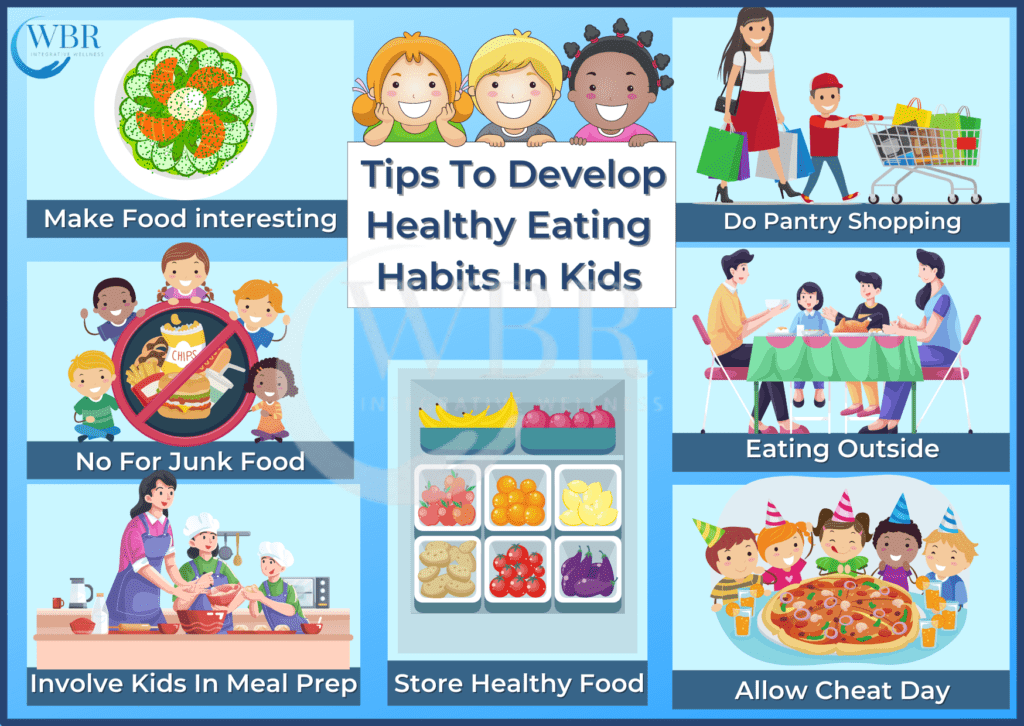Homeschooling offers a unique opportunity to shape your child’s education and lifestyle, including their eating habits. While the flexibility of homeschooling can be a boon for creating healthy routines, it also presents challenges. Are you struggling to keep your homeschooling child fueled with nutritious food while juggling lesson plans and household chores? Don’t worry, you’re not alone! This article will equip you with practical tips and delve into the amazing benefits of healthy eating habits for your homeschooling child.
The Importance of Healthy Eating for Homeschooling Kids
Imagine this: your child is engrossed in a fascinating history lesson, but their energy levels are dwindling. They become restless, their focus wanders, and the learning process slows down. Sound familiar? This is a common scenario for many homeschooling families. Healthy eating plays a crucial role in maintaining optimal energy levels, concentration, and overall well-being, which are essential for successful homeschooling.
Benefits of Healthy Eating for Homeschooling Kids:
- Improved Concentration and Focus: A balanced diet rich in essential nutrients, like omega-3 fatty acids and complex carbohydrates, fuels the brain and enhances cognitive function. This translates to improved focus, memory, and the ability to absorb information effectively.
- Increased Energy Levels: A healthy diet provides sustained energy throughout the day, eliminating the energy crashes that can occur with sugary snacks or processed foods. This means your child can power through their lessons with enthusiasm and vigor.
- Enhanced Mood and Emotional Regulation: Studies show a direct link between healthy eating and mood regulation. A diet rich in fruits, vegetables, and whole grains can help stabilize blood sugar levels, leading to fewer mood swings and a more positive outlook.
- Improved Physical Health: Healthy eating habits lay the foundation for a strong immune system, healthy weight management, and reduced risk of chronic diseases. This is particularly important for homeschooling children who may have limited opportunities for physical activity compared to their traditionally schooled peers.
- Development of Healthy Lifelong Habits: By establishing healthy eating habits early on, you’re setting your child up for a lifetime of well-being. They’ll learn to appreciate nutritious foods, make informed choices, and understand the connection between food and their overall health.


Tips for Establishing Healthy Eating Habits for Homeschooling Kids
1. Involve Your Child in the Process:
- Plan Meals Together: Engage your child in meal planning. Let them choose from a list of healthy options and help with grocery shopping. This empowers them to make decisions about their food and fosters a sense of ownership.
- Cook Together: Cooking together can be a fun family activity. Involve your child in preparing meals, chopping vegetables, or mixing ingredients. This introduces them to new flavors and encourages them to try new foods.
- Make it Fun: Turn mealtimes into a learning experience. Discuss the nutritional value of different foods, explore different cultures through cuisine, or play food-related games.

2. Create a Structured Eating Schedule:
- Regular Mealtimes: Establish a consistent meal schedule, even if it’s slightly different from traditional school hours. This helps regulate your child’s appetite and energy levels throughout the day.
- Healthy Snacks: Offer nutritious snacks between meals to prevent hunger pangs and keep energy levels stable. Fruits, vegetables, yogurt, nuts, and seeds are great options.
- Limit Distractions: Create a calm and distraction-free environment during mealtimes. Turn off the TV, put away phones, and encourage family conversation to promote mindful eating.

3. Focus on Whole, Unprocessed Foods:
- Fruits and Vegetables: Make fruits and vegetables a staple in your child’s diet. Offer a variety of colors and textures to keep things interesting.
- Whole Grains: Choose whole grain breads, pasta, and cereals over refined grains, which are stripped of their nutritional value.
- Lean Protein: Include lean protein sources like chicken, fish, beans, lentils, and tofu in your meals. Protein provides sustained energy and supports muscle growth.
- Healthy Fats: Don’t shy away from healthy fats like avocado, olive oil, nuts, and seeds. These fats are essential for brain development and overall health.
- Limit Processed Foods: Minimize processed foods, sugary drinks, and fast food, which are high in calories, unhealthy fats, and added sugar.

4. Make it a Family Affair:
- Lead by Example: Children are more likely to adopt healthy eating habits if they see their parents doing the same. Model healthy choices and make it a family effort.
- Family Mealtimes: Set aside time for family meals as often as possible. This creates a sense of togetherness and provides an opportunity for everyone to enjoy healthy food together.
- Involve Siblings: If you have other children, involve them in the process of creating healthy eating habits. They can help plan meals, cook, and encourage their siblings to make healthy choices.
5. Be Patient and Consistent:
- Don’t Give Up: Changing eating habits takes time and effort. Be patient with your child and yourself. Celebrate small victories and focus on progress, not perfection.
- Consistency is Key: Stick to the healthy eating plan consistently, even on weekends and holidays. This will help your child develop lasting healthy habits.
- Seek Professional Guidance: If you have concerns about your child’s eating habits or if they have specific dietary needs, consult a registered dietitian or a healthcare professional.
6. Turn Learning into a Fun Experience:
- Food Experiments: Engage your child in fun food experiments. Try making homemade smoothies, experimenting with different spices, or creating healthy versions of their favorite dishes.
- Gardening: Start a small garden with your child. This allows them to learn about where their food comes from and appreciate the growth process.
- Food Journals: Encourage your child to keep a food journal, where they can record their meals, snacks, and feelings about their food choices. This can help them identify patterns and make informed decisions.
7. Embrace Flexibility and Adjust As Needed:
- Individual Needs: Recognize that each child has different dietary needs and preferences. Be flexible and adjust your approach based on your child’s individual requirements.
- Listen to Your Child: Pay attention to your child’s cues and preferences. If they’re not enjoying a particular food, try different ways to prepare it or offer alternatives.
- Celebrate Successes: Acknowledge and celebrate your child’s progress. Positive reinforcement goes a long way in encouraging healthy habits.
8. Be Mindful of Food Allergies and Intolerances:
- Awareness is Key: Be aware of any food allergies or intolerances your child may have. Read food labels carefully and discuss any potential concerns with a healthcare professional.
- Safe Alternatives: Offer safe alternatives for foods that your child cannot eat. There are many delicious and nutritious options available, even for children with dietary restrictions.
- Educate Yourself: Learn about common food allergies and intolerances and how to manage them effectively. This knowledge will empower you to make informed choices for your child.
Conclusion:
Establishing healthy eating habits for your homeschooling child is an investment in their physical, mental, and academic well-being. By involving them in the process, creating a structured eating schedule, focusing on whole, unprocessed foods, and being patient and consistent, you can equip them with the tools they need to thrive. Remember, healthy eating is not just about food; it’s about creating a positive and supportive environment where your child can learn, grow, and develop a lifelong love for nutritious food.






